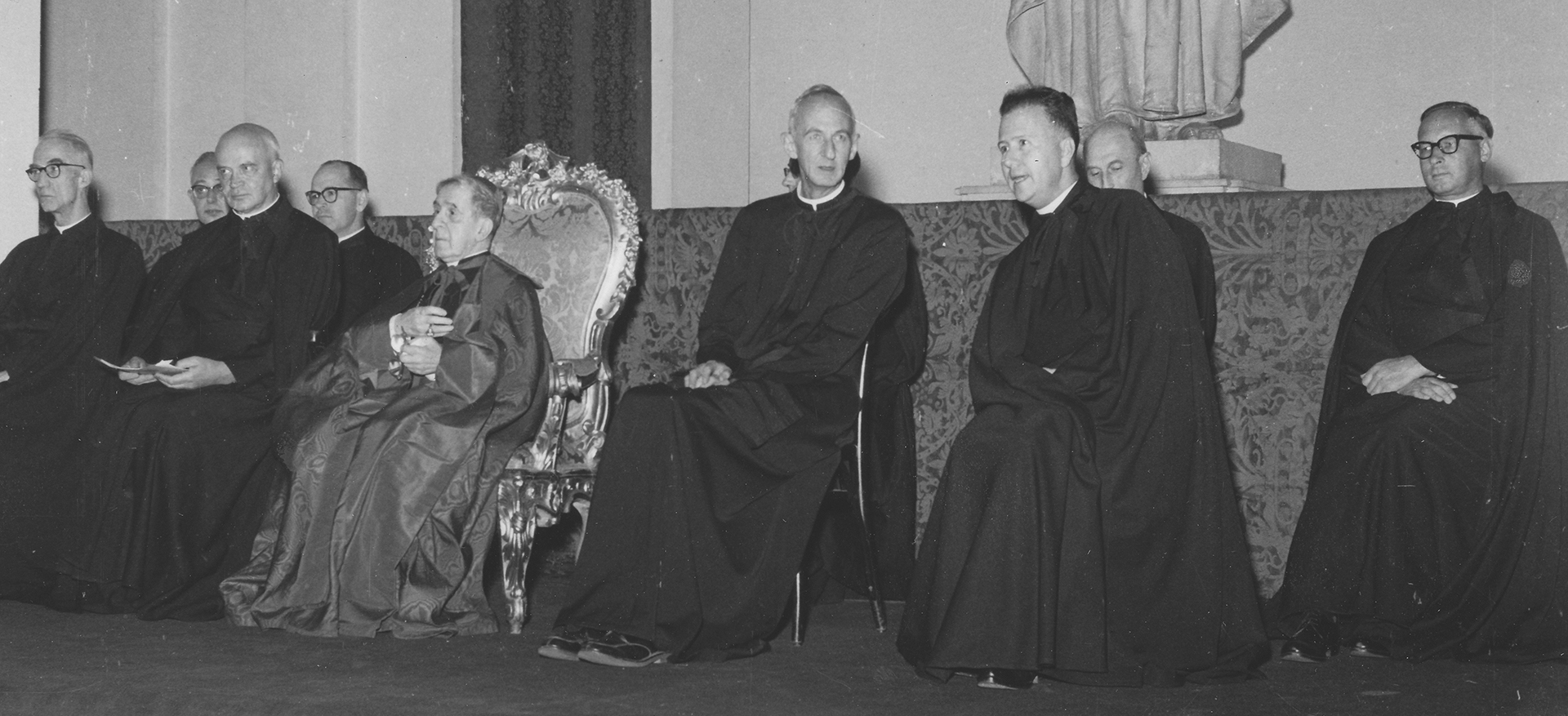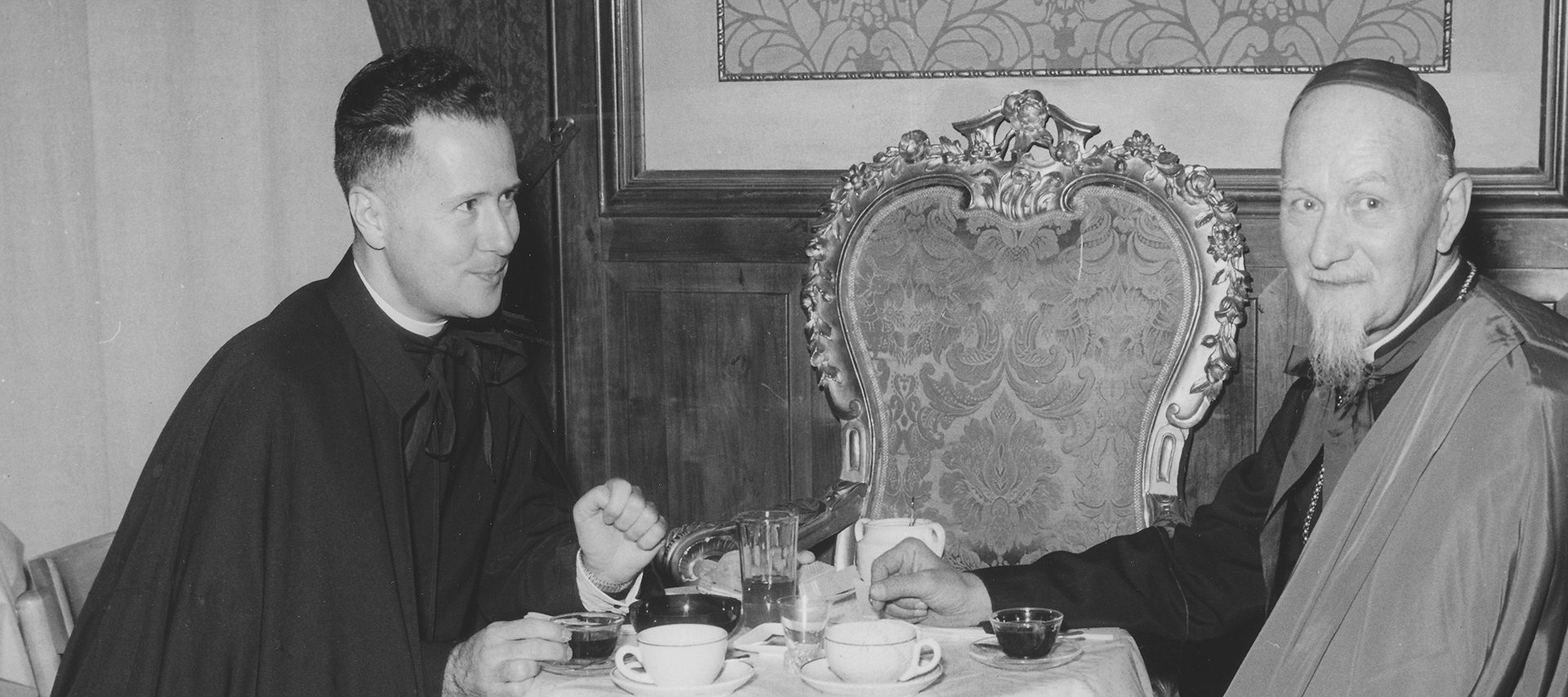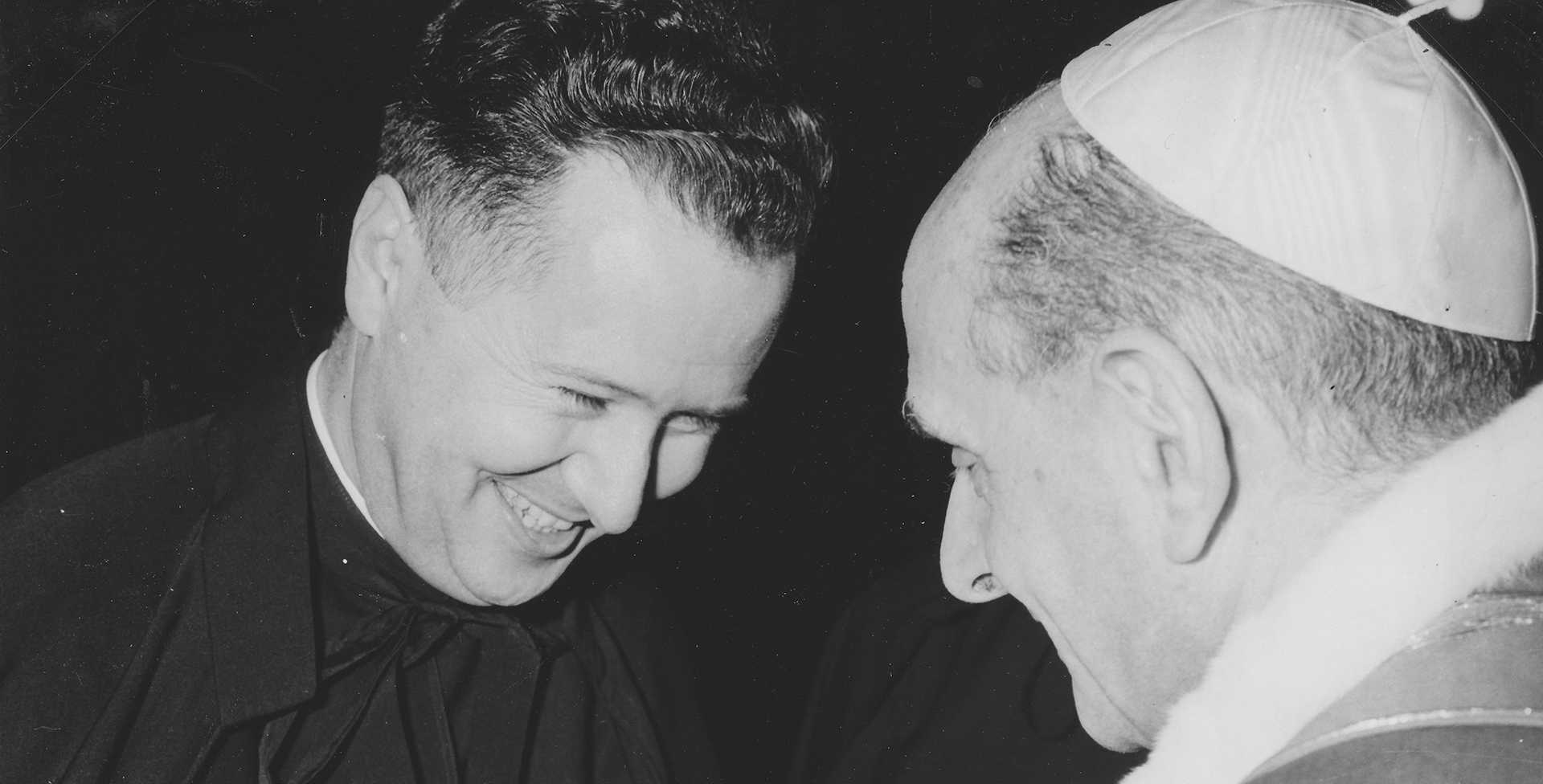- Home
- La Gregoriana
- 58 - To See All Things New in Christ
- Fr. René Latourelle, "father of Fundamental Theology"
Share:

Aware of ongoing socio-cultural transformations, he published
several works featuring theological reflection in dialogue
with post-modernity. These writings clearly attest to his theological
reflection centred on Jesus Christ, the focal point of his life.
Fr. René Latourelle S.J. passed away on November 16, 2017. He was born in Montreal (Canada) on October 28, 1918, into a family that attached great importance to the human and Christian formation of their six children. He entered the novitiate of the Society of Jesus when he was nineteen and was ordained a priest in 1950. In the same year he received his doctoral degree from the University of Montreal Department of History.
He completed his theological studies in Montreal in 1951 and moved to Rome in 1954 to study for a Doctorate in Theology at the Pontifical Gregorian University. During his years of studies, he developed a deeper understanding of the relationship between the biblical and theological notions of Revelation, an intuition encouraged by H. Bouillard and H. de Lubac, whom Latourelle met in Paris in 1953[1]. He continued this research in his Doctoral dissertation La révélation chrétienne: notion biblique, notion théologique, written under the guidance of Fr. Dhanis and defended in 1956. In 1957, he published the second part of his thesis and was thus awarded the degree of Doctor of Theology.
After his return to Canada, he taught Fundamental Theology at the Collegium Maximum NN. Immaculatae Conceptionis in Montréal from 1956 to 1959, where he reached the rank of Full Professor. In those years he served as editor of the journal Sciences ecclésiastiques[2], later renamed Science et Esprit. He was transferred to Rome in the Academic Year 1959-1960, where he taught at the Faculty of Theology of the Pontifical Gregorian University until his retirement in 1989. He was appointed Dean of the Faculty of Theology in 1962, a position he held in three different periods: 1962-1964, 1970-1976, 1982-1985. From 1973 to 1989 he served as advisor to the Congregation for Catholic Education.
The reform of theology at the Gregoriana
At the end of his academic career at the Gregoriana he returned to Canada, but he continued to pursue his theological studies. Against the backdrop of ongoing socio-cultural transformations, he published several works featuring theological reflection in dialogue with post-modernity. These writings clearly attest to his theological reflection centred on Jesus Christ, the focal point of his life. One such example is his work L’Infini du sens: Jésus-Christ, which includes autobiographical notes.
His deanship was characterised by intellectual openness[3] and by an appreciation of academic achievement. Many changes took place in the Faculty of Theology during the years under his guidance, including the creation of a “deanery”, the opening of the faculty to women, classes taught in Italian instead of Latin, and the appointment of the first non-Jesuit faculty members.
Latourelle was not a Council peritus, although in those years he served as advisor to a number of bishops and theologians. After the Council he directly promoted and collaborated in the reform of theological studies at the Gregoriana, instituting three Academic qualifications - Baccalaureate, Licentiate and Doctorate[4]. It should be noted that the first cycle was centred on the study of Sacred Scripture[5], with the incorporation of Fundamental Theology among the specialisations of the Licentiate degree.
His academic commitment led to a reform of fundamental theology, to the extent that Latourelle is often remembered as “the father of Fundamental Theology.” His writings and contributions on the subject are extensive; worthy of mention, inter alia, are ‘La théologie fondamentale à la recherche de son identité’ [6], an article co-authored during the years of the reform of theological studies, and “Démémbrement ou renouveau de la théologie fondamentale” [7], in which Latourelle addresses the problem of dispersion that Fundamental Theology may encounter. He continued writing on this subject until the conclusion of his academic activity.

From apologetics to the self-revelation of God
Fr. Latourelle authored a multitude of studies. Some scholars of his works divided them into three stages: pre-Council, post Council, collective works. The pre-Council period in particular comprises two periods, separated by his doctoral dissertation in theology. The first period, which features numerous works on Saint Jean de Brébeuf, had an influence on his theological methodology, with a focus on the historical dimension. The second period comprises his first writings on Revelation and Fundamental Theology.
His most renowned and seminal work is Theology of Revelation, first published in 1963[8]. The second edition published in 1966 was complemented with some of the works written by Latourelle in those years, and revisited in the light of Dei Verbum. The volume appeared in over 30 editions and was translated into five languages, exceeding one hundred thousand copies[9]. It was recognised as a landmark in the study of fundamental theology for many years to come, offering an understanding of Christian revelation that, albeit widely received today, was hailed as a groundbreaking work at the time.
The first distinguishing trait of his argument is the fact that the study of revelation takes the biblical sources as its foundation. This was not only an important novelty at that time, in fact it also highlights the understanding of theological reflection in Latourelle’s works. Other notable newnesses in this work include the departure from an extrinsic notion of revelation, typical of apologetics, in favour of a conception of revelation as self-communication and self-revelation of God. The centrality of Christ and the prominence of history and language are recovered, all of which are dimensions reflected in Dei Verbum, and are central to the study of a theology of revelation today.

Christ, “Sign that gives meaning to all signs”
That work was expanded further, as featured in a number of articles that appeared during those years, subsequently incorporated into successive editions of Theology of Revelation. These are: L’idée de Révélation chez les Pères de l’Église[10], which eventually formed Part II of Theology of Revelation, and La Révélation comme parole, témoignage et rencontre[11], a seminal work in that the categories mentioned above were to constitute a distinctive feature of the Revelation terminology employed by Latourelle. Finally, Miracle et Revélation[12], and Église et parole[13] appear in part V of the same work.
The centrality of Christ, Sign that gives meaning to all the other signs, is a theme explored in depth in Latourelle’s Christ et l’Église signes du salut (1971), a work that followed several articles he authored on the theme of the signs of Revelation and the sign of holiness. Worthy of mention are also the three volumes L’accès à Jésus par les Evangiles: histoire et herméneutique (1978), L’homme et ses problèmes dans la lumière du Christ (1981), Miracles de Jésus et théologie du miracle (1986), wherein he elaborated on the theology of the “signs” of Christian credibility. In those works, Latourelle argues that the Word of God and human history, the two benchmark points of theology, are not in conflict with each other, but complementary.
Notable collective works include Problems and Perspectives of Fundamental Theology (1980, updated in 1982) [14], Vatican II: Assessment and Perspectives, Twenty-Five Years After ( 1962-1987) (1987), Dictionary of Fundamental Theology (1990) [15]. These works feature the contribution of highly distinguished scholars and they reflect not only Father Latourelle’s profound scholarship, but also his remarkable collaborative spirit.
Latourelle has made a significant contribution to Fundamental Theology at a time when it was at risk of disappearing from theology curricula, and when a clear direction was needed, recovering the centrality of Christ and the role of human history.

[1] Cf. R. Latourelle, L’Infini du sens: Jésus-Christ, 25.
[2] He had previously founded the magazine Jésuites Canadiens (1948), with the purpose of providing financial support to Jesuit students (cf. R.Latourelle, L’Infini du sens: Jésus-Christ, 20).
[3] A sign of this openness is the number of invited distinguished professors of theology and philosophy from various countries, such as A. Dulles, H. Bouillard, G. Martelet, K. Rahner, X. Zubiri, W. Kasper and others (cf. A. Restrepo Sierra, La revelación según René Latourelle, 17).
[4] Theological studies were previously divided into two stages. Cf. A. Restrepo Sierra, La revelación según René Latourelle, 16.
[5] This reform grouped the study subjects around three major themes: Christology, ecclesiology and anthropology.
[6] Published in Gregorianum 50 (1969) 757-776.
[7] Published in Concilium 46 (1969) 29-37.
[8] The source of this text is the doctoral thesis.
[9] Figures found in R. Latourelle, L’Infini du sens: Jésus-Christ, 29 and A. Restrepo Sierra, La revelación según René Latourelle, 15.
[10] Article published in Sciences Ecclésiastiques 11 (1959) 297-344.
[11] Article published in Gregorianum 43/1 (1962) 39-54.
[12] Article published in Gregorianum 43/3 (1962) 492-509.
[13] Article published in Sciences Ecclésiasiques 15 (1962) 195-211.
[14] Co-edited with G. O’Collins.
[15] Co-edited with R. Fisichella.

